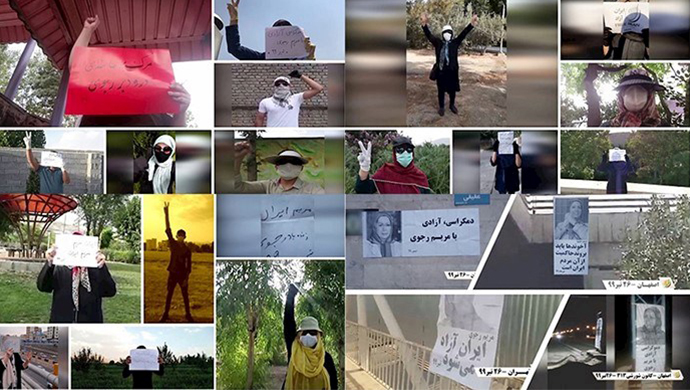On August 2, IRNA, the Iranian regime’s official news agency, organized a roundtable with five of the regime’s so-called “experts” on the occasion of releasing a new book, the latest chapter in the regime’s endless demonization campaign against the People’s Mojahedin Organization of Iran (PMOI/MEK). The participants confessed to important points about the PMOI. It is worth noting that these individuals are security and propaganda officials, and sometimes interrogators and torturers of the regime’s suppression apparatus. But the regime’s news agency, as usual, presented them with titles such as university professor, history researcher, and author.
Mohammad Atrianfar asked the question: “Why is the PMOI so important? What kept it alive?”
Other participants in the roundtable each tried to answer this question.
Ebrahim Fayyaz said, “History repeats itself, and I think the PMOI will probably return.” He admitted that the youth have turned away from the regime and are gravitating to the PMOI and added, “Unfortunately, the Islamic Republic is not transparent to the new generation and has not been able to explain this to the youth. The fact that the PMOI is structurally still alive and a group [of people] want to join them shows that it is not just because of the support of the United States and Britain. We haven’t yet destroyed the PMOI.” Of course, regime authorities always have to rehash debunked claims of associating the PMOI with foreign powers, because not doing so would further drive the point that the PMOI is a movement rooted in the Iranian society.
“The fact that the PMOI are alive today should be important for the government and should be examined to better understand it,” Fayyaz said.
Mohammad Quchani made the point that “the PMOI has split the country.” His later explanation and the phrase “dual government and opposition” made clear that he meant that the PMOI has polarized the society between the people and resistance on the one hand, and the ruling regime on the other.
Quchani said, “We have to know that the Mojahedin-e Khalgh issue is the issue of our day and it is not just a historical issue.” He implicitly admitted that the PMOI is a key player in leading protests against the regime, saying that “wherever the people’s rightful protests were diverted, the organization was involved.” Of course, by “diverted,” he refers to slogans that call for the overthrow of the entire regime, which are being chanted by millions of people in Iran. He also said, “The separation of clergy and state from the people is the work of this organization.” He concluded by stressing the urgency of dealing with the Iranian Resistance: “So the issue of the PMOI is today’s issue.”
Abbas Salimi Namin summarized the discussions of the roundtable as such: “Our main issue in the country is the PMOI and we must address it.”
The fact that the mullahs’ dictatorship and its security and propaganda officials are admitting that the PMOI is the regime’s main issue is like rediscovering fire. Nonetheless it is important, in that it is a clear admission to the failure of the regime’s main strategy against the PMOI. Over the past 44 years, the mullahs’ regime has consistently led efforts to pretend that the PMOI has no base or importance inside the country, spending exorbitant sums and using all sorts of tricks with an army of domestic and foreign mercenaries and so-called “journalists friends” and lobbyists.
But now, the reality of intense political situation and turbulent times and the continuous uprisings and the looming threat of the regime’s overthrow has forced it to admit that “the problem of PMOI is our problem today.”
But the larger reality is that the PMOI has been the regime’s main problem, and the main obstacle to Ruhollah Khomeini the Iranian people’s revolution since the first day of the 1979 revolution.
In 1979, Khomeini himself explained his war against the PMOI in an audiotape circling between the IRGC and his plainclothes thugs. A year later, in July 1980, he made the war public, saying: “Our enemy is not in the US, not in the USSR, not in Kurdistan, but here in front of our eyes in this very Tehran.” All of Khomeini’s subsequent atrocities, from the daily executions of 1981 to the massacre of the 1988 massacre of political prisoners, and the continuation of these crimes by Khomeini’s criminal remnants were the continuation of his war to eradicate the PMOI.
Therefore, the statements of the regime’s “experts” are an inevitable admission of strategic defeat against the PMOI as the main enemy and adversary of religious tyranny; a confession to the victories of the Iranian people and their resistance movement against the regime in their uprisings inside Iran and their achievements across the globe.





